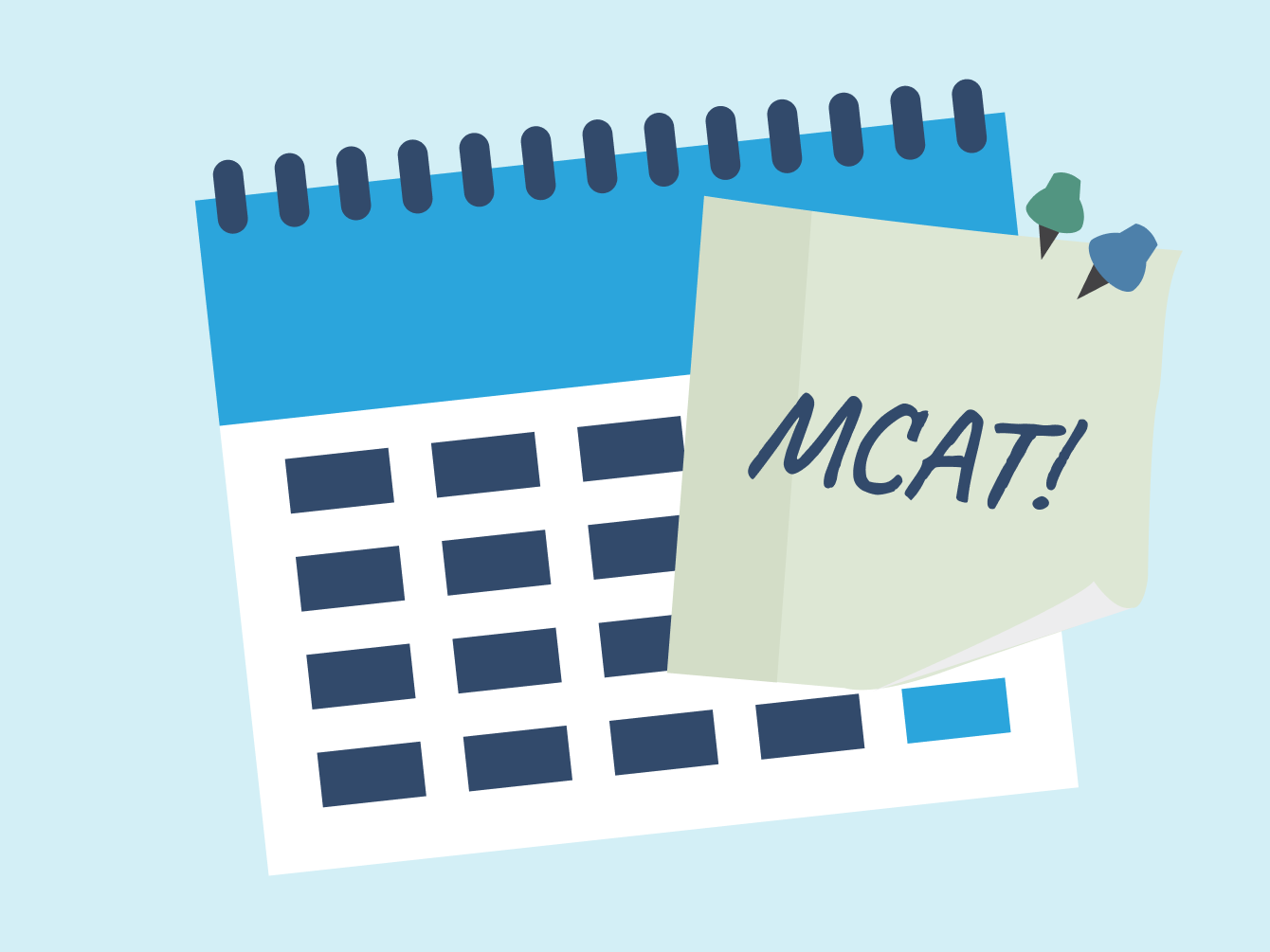Only an MCAT student could possibly appreciate the gravity of choosing their MCAT test date. This is the biggest hurdle between you and a career and medicine … certainly the biggest you’ll have faced until now.
And when every point counts, the last thing you want to do is compromise your score by selecting a less-than-perfect MCAT test date (for you, your pace of learning, and your ability to meet those all-important medical school application deadlines).
There are a lot of moving parts to this decision and so, in this article, we’re going to give you all the criteria you should consider before setting an MCAT test date so that when you finally do, you'll be READY!
In this guide, we’ll be answering key questions like: When should you take the MCAT? And which MCAT test date is easiest? (Is that even a thing?) But, before we dive in, two things:
- Consult the American Association of Medical Colleges (AAMC) website for details on the current/next year’s test schedule so that you know which dates are available.
- Choose carefully! The MCAT is an expensive test to take ($345 USD at the time of writing). And it costs up to an additional $200 to reschedule or change your test venue.
Got it? Good. Let’s now take a look at that criteria!
How To Consider School Application Deadlines Before Choosing A Date
If it’s important that you attend medical school right after graduating from college, you’ve got to take the MCAT in time to (1) get your results back and (2) get your applications into your desired schools. So your first step is to find out what those application deadlines are.
Then, work backwards from those dates to determine the best MCAT test date for you, factoring in the standard 30 to 35 days it takes to get your MCAT test results from the AAMC and ample time (at least a month) to put together robust medical school applications.
You may push it even earlier because you’ll want to be among the earliest considerations for your school of choice!
Register As Soon As You Can…

The MCAT is offered between 20 to 30 times per year, so you have plenty of options; EXCEPT that seats fill up super quickly. Every year, in February and October, the AAMC opens MCAT registrations.
- October registration: for all test dates between January and May
- February registration: for all test dates between June to September
So, if you want to arrange your MCAT test date for June, get online as early as you can in October to choose your ideal date and location.
Remember, everyone is anxious to get through the MCAT as soon as possible so that they can meet the med school application deadlines for the following year. So, the earlier you register, the better, provided that you give yourself enough time to actually study for the MCAT (more on this shortly).
… But Not Before You’ve Completed Your Pre-Requisite Courses For Medical School!
You do NOT want to be studying subjects from scratch for the MCAT. You should already have covered everything in class, and passed your college exams before taking on the MCAT.
Yes, some people do try to study for the MCAT while still in college. That’s a decision you’ll have to make, taking into consideration how up-to-scratch your knowledge and skills are, and how much time you can spare to study, while also actively learning in class and taking finals.
I’d recommend taking one of the AAMC’s practice exams (in one sitting) to see how you fare. Don’t expect to do well—almost no one does on their first try—but you can use it to see what you’re up against and if you’ve got the bandwidth to cope with the extra studying.
Give Yourself Enough Time To Actually Study For The MCAT!

Some MCAT prep experts say you should give yourself at least three months to study for the MCAT; others say six. We’re going to encourage you to take responsibility for your prep by knowing your strengths and weaknesses, drawing up a detailed study plan, and using that to determine your ideal timeline.
Just don’t make the mistake of rushing to take the MCAT before you’re ready! There literally isn’t a better analogy for shooting yourself in the foot. You’ll only score low and have to retake it, which adds dwindling time and money to your list of problems.
Other Questions Students Ask About The Best MCAT Test Dates ...
The aforementioned points are really the pillars of choosing an MCAT test date:
- Consider medical school application deadlines,
- Register as soon as you can ...
- … But not before you’ve completed your college prerequisites, and
- Give yourself enough time to study for the MCAT.
Now, here are some of the other questions we get from students …
Can You Register For Two MCAT Test Dates?
NOPE! You can only have one MCAT test date at a time.
Some students will, as soon as they’ve taken the MCAT, register for the next convenient date, just in case they fail. This means they’re set up to try again even before they know whether they’ve failed or not.
The key here is arranging your second attempt with enough time to (1) get your results and (2) cancel, if you’re happy with your score BEFORE the Gold Zone Deadline (30 days prior). If you cancel before this date, you’ll get $160 refunded. After, and you’ll get zilch.
Which MCAT Test Date Is The Best?
This is quite a subjective question because some people (I’d say the vast minority) are capable of pushing themselves to complete college while studying for the MCAT at the same time. This enables them to take the MCAT during finals or soon thereafter.
But don’t fool yourself. The MCAT is a monster undertaking, so having other academic obligations, especially ones as demanding as finals, is strongly advised against.
For this very reason, the preferred MCAT test dates fall over the summer months (July to September). Having your summer open to studying offers a definite competitive advantage to scoring higher on the MCAT because you’ll have no other demands eating up your time and focus. Buuuut, everyone’s different, so here are some pros and cons for the various months available for the MCAT …
April
Pros: Have your MCAT done by finals, get your scores back before June, and have time to retake if necessary.
Cons: Have to study for the MCAT while in college, and take it in the middle of the semester. Madness.
May
Pros: Content is fresh in your mind from college classes; time to retake if necessary.
Cons: Juggle MCAT prep with studying for college finals (and the two are VERY different).
June
Pros: Have a month to study after the semester ends.
Cons: Launching straight into MCAT study right after finals (no downtime). Also, if you don’t pass, you may have to wait for the following year to retry.
July
Pros: Two months to completely focus on the MCAT, with a few months left afterwards to enjoy your summer.
Cons: You’ll have to start your prep well before the end of the semester and wait for the following cycle to retry if you fail.
August
Pros: A few months of focused study without any other distractions (you’ll have to be disciplined).
Cons: Basically, your whole summer will be dedicated to studying. And you won’t be allowed to take the MCAT again until the following cycle.
September
Pros: Have the whole summer to prepare for the MCAT, which’ll give you a little more freedom to actually enjoy the summer. You’ll also have the entire year to retake, if necessary.
Cons: The test coincides with the beginning of the new semester of medical school, which means you’ll have to wait until the following year to enroll.
Which MCAT Test Date Is The Easiest?
Okay, so this is A MYTH. All MCATs are created equal. And besides, it’s all subjective: what you find difficult might be someone else’s easy, and vice versa.
For example, if you’re an organic chemistry whizz and the test levies a ton of organic chemistry at you, you’ll probably walk away satisfied that you had an easier time of it. If, on the other hand, you truly suck at philosophy and sociology, and the test nails you on those subjects, you’ll have a different impression.
Irrespective of all this, your final score is scaled based on how your fellow students performed on the same day as you. So if the test were harder, everyone would take a knock, but your scaled score would turn out the same.
A Final Word On How To Choose Your MCAT Test Date

The MCAT is one of the most important hurdles you’ll jump on your path to becoming a qualified healthcare professional, and that’s really exciting! But many students get caught up in the urgency of wanting to get into medical school sooner rather than later and, in doing so, don’t leave themselves enough time to study for the MCAT.
This, ironically, lands them further behind than they’d hoped.
So, my final tidbit of advice to you is to stay in your lane: keep your eyes on your progress and know yourself. Don’t compare yourself to anyone else. And if you want advice, speak to people who are qualified to provide it: college professors, MCAT tutors, and students who are already in medical school. Even then, get a variety of opinions if you really feel you need them.
At the end of the day, trust yourself, and if you need more time, take it. And remember: you’ve 100% got what it takes to conquer the MCAT!
